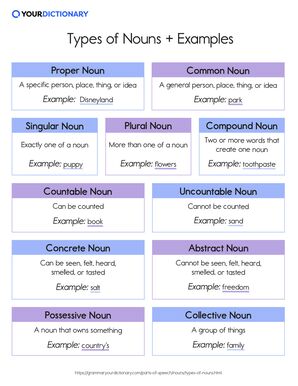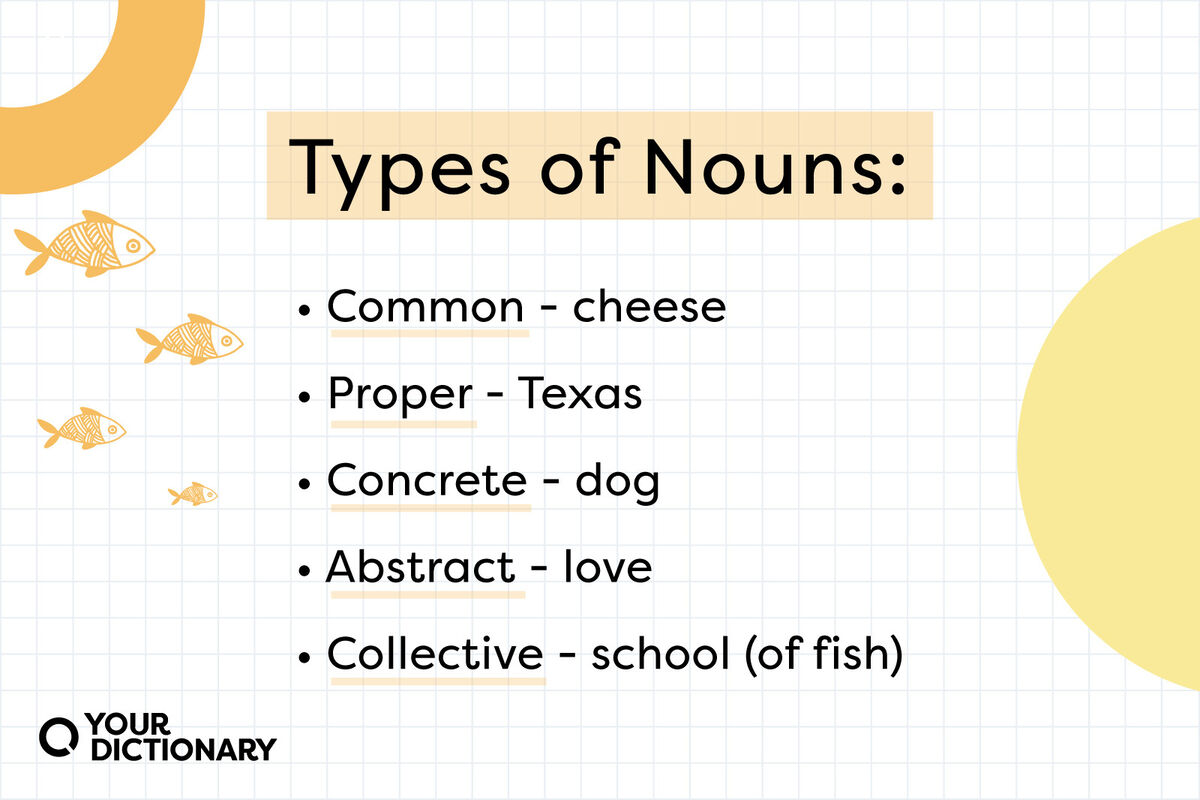

You know that nouns describe people, places, things, and ideas — but can you name the different types of nouns? From plural nouns to possessive nouns, all the way to common nouns and collective nouns, there are many ways to name that thing (or person, place, or idea) that you’re trying to describe.
What Do Nouns Do?
Once you know what a noun is, you can identify what kind of noun you’re looking for. There are many different types of nouns, each designed to serve a different purpose in a sentence (and some can serve more than one purpose at a time).
- nouns name things
- nouns perform actions
- nouns receive actions
- nouns redefine other nouns
There are many noun examples in the English language. Download this PDF chart to serve as your reminder of each type.

Common Nouns
Common nouns refer to people, places, things, or ideas in general terms. They aren’t capitalized, and they aren’t specific.
- My friend joined me for dinner at the restaurant.
- Their dad graduated from college.
- Your sister bought a new car.
Proper Nouns
Proper nouns name specific nouns, which are always capitalized.
- Sheri joined me for dinner at Giovanni’s Pizza.
- Dad graduated from UCLA.
- Ruby bought a new Mercedes.
Singular Nouns
A singular noun refers to one person, place, or thing.
- My brother lives in Oregon.
- This meal was very delicious.
- I stayed at a hotel last night.
Plural Nouns
A plural noun refers to more than one person, place, or thing. You can make a noun plural by adding -s or -ies to the end (unless it’s an irregular noun).
- I have lived in three different apartments.
- Fiona is planning to take at least two vacations this summer.
- Please list two more articles in your research paper.
Concrete Nouns
Concrete nouns exist physically. You can actually touch, see, feel, smell, or taste them.
- Can I pet your dog?
- Please pass the salt.
- Those cookies smell delicious.
Abstract Nouns
Abstract nouns refer to concepts or feelings that cannot be experienced concretely or touched physically.
- All you need is love.
- Toddlers practice independence by doing things by themselves.
- We must use this time wisely.
Countable Nouns
Countable nouns are nouns that you can count. They can be singular or plural, depending how many they are. They can also be modified by numbers or quantifying determiners, such as many, most, more, or several.
- There is a bike in that garage. (The word bike is singular because it refers to one bike.)
- There are six bikes in that garage. (The plural noun bikes refers to six bikes.)
- There are several bikes in that garage. (The quantity of bikes is more than one, so bikes is plural.)
Uncountable Nouns
Uncountable nouns, also known as mass nouns, include nouns that can be measured but not counted (such as intelligence or milk). They also include all abstract nouns and usually do not take plural forms (you’d say milk, not milks).
- The garage is full of clutter. (clutter isn’t countable)
- I'm eating oatmeal for breakfast. (oatmeal isn’t countable)
- I value our friendship. (friendship isn’t countable)
Collective Nouns
Collective nouns refer to a group of something in particular. They are treated as singular nouns (even though they describe more than one noun) and use singular verbs.
- A herd of wild buffalo rumbled down the prairie.
- There is a crowd of kids in the pool today.
- The team did a great job in the competition.
Compound Nouns
A compound noun contains two or more words that join together to make a single noun. They can be one word (closed form), joined with a hyphen (hyphenated form), or two words (open form).
- This new toothpaste is too minty. (closed form)
- My son-in-law is so kind and considerate. (hyphenated form)
- Can you stop by the post office on your way home? (open form)
Possessive Nouns
Possessive nouns show that a person, place, or thing owns something. Singular possessive nouns end in an apostrophe and “S”. Some plural possessive nouns that already end in an “S” just have an apostrophe at the end.
- Melissa's imagination ran wild as she daydreamed about her upcoming trip.
- Ireland's landscape is truly breathtaking.
- The puppies’ favorite toy is the squeaky newspaper.
Words That Act Like Nouns
A few other types of words can function like nouns when they appear in sentences.
Pronouns
Personal pronouns take the place of nouns when referring to people, places or things.
- Amy works at a flower shop. She enjoys her job.
- The Greeks invented democracy. They sought freedom and equality.
- Marley loves pepperoni pizza. The last slice of pizza is hers.
- Jennifer is paying for the tickets. Give the money to her.
- Things don't look good for John and Ray. The police are looking for them.
Gerunds
Gerunds are -ing verbs that function as nouns. At first glance, gerund examples appear to be verbs. But if you look a little closer, you’ll find that they’re the subjects or objects of their sentences, not the action words.
- Do you mind my borrowing these shoes?
- Rowing is Juan’s favorite exercise.
- I don’t like studying when there’s a test coming up.
- Paula enjoys reading on a rainy day.
- My nephew likes performing, especially in front of a lot of people.
Test Your Noun Knowledge
There are many types of nouns, each designed to serve a different purpose in a sentence. Test your knowledge with a quick noun quiz.
Noun Types Quiz
Review the bold words in the sentences below, and decide what type, or types, of noun each one is. Work through the questions on your own, then review the answers to see how you did.
- I'm planning a trip to Pennsylvania later this year.
- Your room is such a mess.
- Our countertops are made of granite.
- My daughter is enrolled in softball camp this year.
- That’s Eunice’s new puppy.
- My uncle has anxiety about his new job.
- I am looking forward to going to the beach.
- The class behaved well for the substitute teacher.
Noun Types Quiz: Answer Key
Check your work using the answer key below.
- Pennsylvania - proper noun
- mess - uncountable noun or common noun
- countertops - plural noun or countable noun
- daughter - singular noun or common noun
- Eunice’s - possessive noun
- anxiety - abstract noun
- beach- common noun or singular noun
- class - collective noun